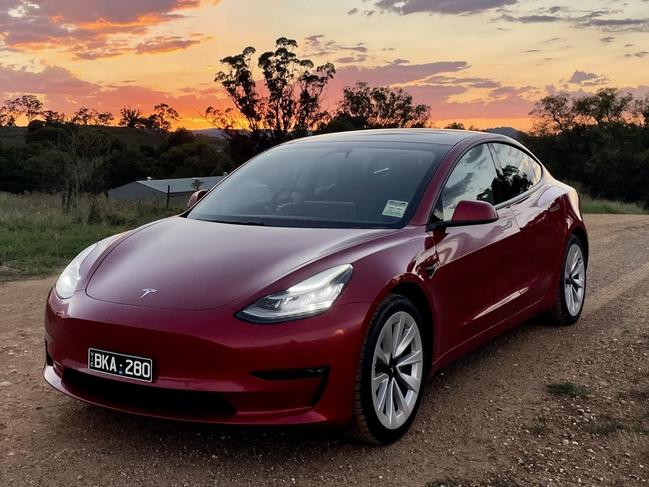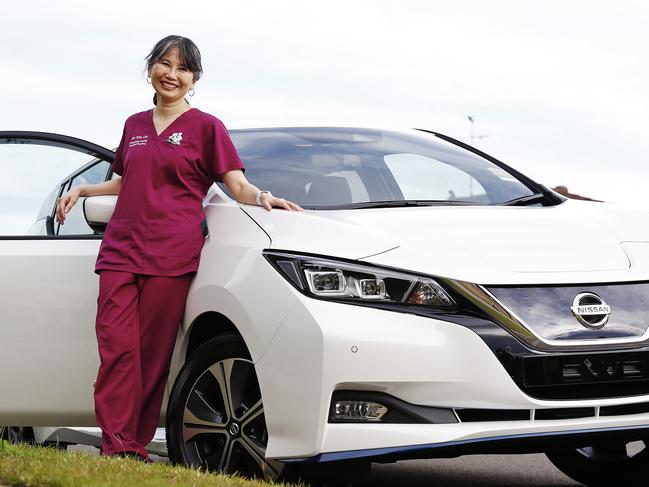Electric car prices set to fall and help ‘drive Australia out of the automotive third world’
The price of an electric car is tipped to fall below $40,000 in some Aussie states, but industry leaders say the move is not enough.
The price of an electric car will finally drop below $40,000 in some states amid moves to make the clean machines more affordable and help “drive Australia out of the automotive third world”.
But buyers across Australia are still being denied access to cheap electric vehicles (EVs) by the lack of a cohesive national policy with CO2 targets and incentives, senior car industry figures argue.
The NSW Government revealed last week it is introducing a new $3000 incentive for EV buyers — joining Victoria and Queensland, where financial incentives are also offered.
MG, which makes Australia’s cheapest electric SUV, said the grant would likely drop the price of its family-sized ZS SUV to $39,670 in NSW from September.
MG’s director of marketing and product, Danny Lenartic, said incentives in Victoria and NSW had already triggered an uptake in inquiry for EVs.
“We’ve been delighted with the uplift in Victoria and are looking forward to September when we can offer more attractive deals in NSW,” he said.
While the car industry has applauded the state moves, it continues to lobby for stronger EV policy from the Federal Government.
Volkswagen Australia managing director, Michael Bartsch, said the state’s strategy was the “model to drive Australia out of the automotive third world” and “ bring about mass ownership of affordable electric vehicles.”
But he warned the lack of a mandated CO2 target from the Federal Government meant that affordable EVs were being supplied to European markets instead of Australia.
“Europe’s mandatory carbon targets, enforced by severe penalties, will ensure that those markets continue to be the first in line for zero emission vehicles,” he said.
Without a CO2 target, Mr Bartsch said, Australia risked becoming “a dumping ground for technology that cannot be sold in advanced countries.”

Hyundai Chief Operating Officer, John Kett, said NSW was now setting the pace on EV policy.
“Significant investment in the charging network, in both urban and regional areas, is a welcome initiative. Highly developed infrastructure provides confidence to customers and removes uncertainty around being able to charge EVs away from home.
“Providing stimulus for improving low EV adoption rates in Australia by offering tax relief and purchase incentives for customers is another encouraging step. We’ve seen government incentives stimulate adoption rates in advanced markets overseas and the NSW EV strategy is at world best-practice levels in that regard,” he said.
Electric vehicle policy could once again become a key policy platform at the next federal election, as Australia continues to lag behind the rest of the world in EV take-up.
EVs made the headlines at the last election when Prime Minister Scott Morrison accused former Opposition Leader Bill Shorten of wanting to “end the weekend” by forcing people to drive electric cars that “won’t tow your boat”.
But Mr Morrison is unlikely to get much support for that rhetoric from the Liberal Party’s strongest state.

NSW Minister for Transport and Roads Andrew Constance has been openly critical of the Federal Government’s EV policy.
“We’ve got to look at these matters differently. We can’t just get into the same old political arguments, expending energy unnecessarily when we could be debating great public policy around innovation
“We’ll be cutting off our nose to spite our face if we don’t start to lay the right public policy groundwork around EVs in our community,” he said.
The NSW Government’s $490 million commitment to EVs includes tax cuts, stamp duty rebates and infrastructure development.

From September this year, the government will remove stamp duty for EVs costing less than $78,000. It will also offer a $3000 rebate for the first 25,000 buyers of EVs costing less than the luxury car tax limit of $68,750.
NSW has also committed $171 million for new charging infrastructure across the State and $33 million to switch the government fleet over to fully electric by 2030. It will delay the introduction of a road tax for EVs until 2027.
Mr Constance said the package would “make electric vehicles accessible and affordable”.
“Electric vehicles are not only cheaper to run and quieter on our roads, but they also reduce both carbon emissions and air pollution which results in dramatically improved health outcomes for our communities,” he said.
NSW aims to have EVs make up more than 50 per cent of new-car sales by 2030. Victoria has announced a similar target, although it is also introducing a road tax for EVs, in a move that has been widely criticised.
Queensland, South Australia and Western Australia have all committed money for charging stations.

Ironically, NSW’s 2030 target is identical to the one proposed by Mr Shorten – and pilloried by the Morrison government prior to the last election.
Queensland Transport and Main Roads Minister Mark Bailey said the Federal policy vacuum on vehicle emissions had meant the states were left to carry the can.
“The Federal Government is missing on EV policies and incentives so it’s been left to the states to do the heavy lifting in terms of preparing for the changes we’ll see in the transport sector over the next five to ten years,” he said.
The Federal Government’s EV strategy, unveiled in February, focuses on infrastructure development, integrating EVs into the grid and government fleet buying commitments rather than financial incentives and CO2 targets.
The Minister for Energy and Emissions Reduction, Angus Taylor, said the government had committed more than $1.4 billion to help increase EV take-up, including $74 million through its “future fuels package”.

But he said incentives were not an effective way to stimulate the EV market.
“Modelling shows subsidies for battery electric vehicles are not value-for-money for taxpayers and are an expensive form of abatement,” he said.
“The Government is focused on ensuring Australian motorists can choose the vehicle they want to drive – be that petrol, diesel, hydrogen or electric powered,” he said.
In contrast, Labor says it will introduce an “electric car discount” exempting cars that cost less than $77,565 from import tariffs and fringe benefits tax.
It says the import duty exemption could save buyers of some cars up to $2000, while the FBT exemptions could save businesses up to $9000 a year.
Constance believes public sentiment on EVs has changed since the Coalition made political mileage out of Shorten’s EV plan, particularly after the bushfire disaster.
“There’s a marked shift in the community view on matters to do with climate change and sustainability,” he said.
A BREATH OF FRESH AIR
Air quality concerns prompted paediatrician Kim Loo to buy a Nissan Leaf in 2019.
“I give lectures to medical students on the effects of car pollutants on children,” she said.
She said pollutants from diesel and petrol vehicles had been linked to respiratory problems, asthma attacks and even cognitive function in young children, so the thought of driving a car with no tailpipe emissions appealed to her.
“I wait at school for my daughter and see all these petrol and diesel vehicles sitting there idling and putting out terrible pollution,” she said.

NSW Minister for Transport and Roads Andrew Constance said air quality in cities would improve significantly as EV take-up grew.
“Regardless of anybody’s view on climate change everyone is going to benefit from EVs,” he said.
“They are finding very clear empirical medical evidence showing impacts on young children, both in terms of their respiratory health, cancer rates and asthma and the like.
“There is an incredible health benefit and a reduction in cost for our health system if we do this,” he said.
Dr Loo said the Leaf had been perfect for her, as she mainly did short trips around town.
“I charge it once every three days or so and I’ve got solar panels so it’s cheap to run,” she said.
She used to pay $160 to $180 a month for petrol and her total electricity bill for the past quarter was just $210.
“This is the first time I’ve really loved my car, and I’ve been driving for more than 30 years,” she said.

ELECTRIC VEHICLE POLICY BY STATE
NSW
A $490 million commitment includes tax cuts, stamp duty rebates and infrastructure development. Stamp duty removed for cars less than $78,000, $3000 rebate for early adopters, $171 million spent on charging infrastructure and a commitment to change government fleet to fully electric by 2030. Road tax delayed till 2027.
VICTORIA
A $100 million package that includes a $3000 subsidy for buyers of cheaper EVs, more charging infrastructure and a commitment to buy EVs for the government fleet.
Queensland A $2.75 million expansion of its charging station network into western parts of the state, taking the number of government chargers from 31 to 49. Discounts on registration and stamp duty.
SOUTH AUSTRALIA
An $18 million commitment to EV infrastructure. Road tax for EVs delayed.
WESTERN AUSTRALIA
A $21 million investment in infrastructure and commitment to converting 25 per cent of the government fleet to EVs by 2026.
More Coverage
Originally published as Electric car prices set to fall and help ‘drive Australia out of the automotive third world’





